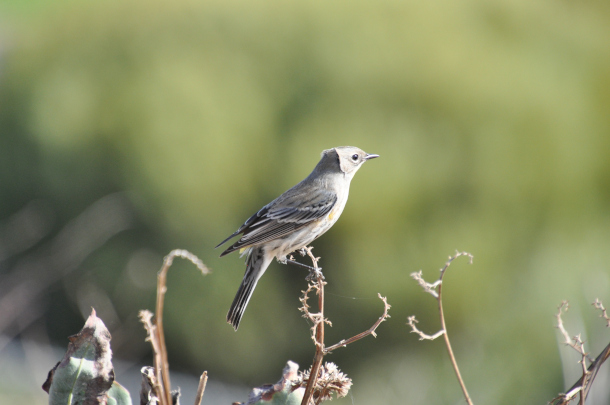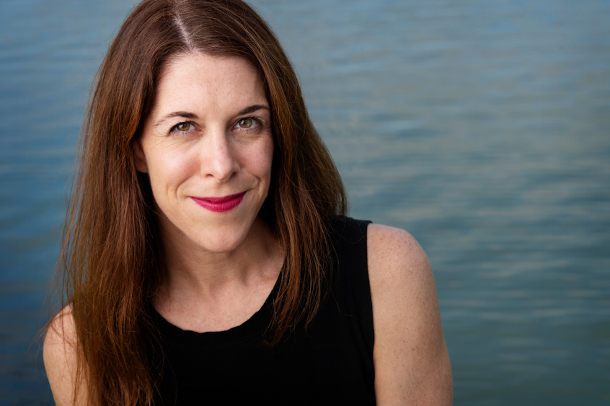"What I Want to Believe About the Vireos"
Air Date: Week of May 5, 2023

A vireo perches atop a twig. (Photo: yuki_alm_misa, Flickr, CC BY-NC-ND 2.0)
The songbirds called vireos have increased in number by more than 50 percent in recent decades, while birds overall are struggling. That was the inspiration for Poet Laureate of Mississippi Catherine Pierce’s poem, “What I Want to Believe About the Vireos.” She joins Host Jenni Doering to share and discuss.
Transcript
DOERING: Letting your lawn go a little wild this May can help emerging insects and a cascade of other animals that eat insects including may bird species. And that’s crucial right now as North American birds have declined roughly 30 percent since 1970, mostly due to habitat loss, invasive species and predation from cats. But some birds seem to be doing just fine despite these challenges. Vireos grew by more than 50 percent since 1970. These songbirds are a rare example of a species that’s prospering amid the ecological crisis we’re causing, inspiring this imaginative poem from the poet Laureate of Mississippi.
PIERCE: I’m Catherine Pierce, and this is my poem, What I Want To Believe About The Vireos.
The vireos are plotting.
They are everywhere and various
and all with names
like Shakespearean villains
disguised as Shakespearean clowns.
Black-whiskered.
Plumbeous. Slaty-capped
shrike. Their songs drop
from the canopy like candied
needles, and everyone smiles. Sweet
birds. They’ve been above us
for centuries, watching. See
their eyes: small bright
pebbles that betray
nothing. They know
patience. See them tableau’d
on the oak branch
for minutes before diving
for the fat black beetle.
They know how green works,
how it muscles back, always,
once the pillars and poisons
are gone. They’re playing
the long game. Weary,
weary, weary, trills the scrub
greenlet. It’ll all be theirs
again—rain forests, mangroves,
the great deciduous rustle.
The breeze and moss.
The loam and sunrise.
The vireos will be here
at the end and at the next
beginning. The red-eyed
vireo’s call will sound then
like it does now, like
it’s constantly asking
and answering
its own questions.
What did they do?
They did.
What did they know?
They knew.

Catherine Pierce is the author of four books of poems including Danger Days and The Tornado Is the World and is professor of English and co-director of the creative writing program at Mississippi State University. (Photo: Megan Bean / Mississippi State University)
DOERING: They seem to have such agency in this poem, as you imagine it.
PIERCE: Yeah, I wanted to sort of give the birds credit. I was imagining this as they're playing the long game, as it says in the poem. They see the destruction that's being kind of brought to their habitats. And they're, they're playing the long game, they're going to wait it out, they're going to stick around. They imagine that eventually humans will kind of... they'll kind of eradicate themselves, and then all the green will come back and all the birds will come back. And so it's, it's a bleak fable, but it's only bleak for the humans. I think it's really good for the birds.
DOERING: And what about us? Are we playing the long game? Do you think? I don't get that sense from your poem.
PIERCE: You know, I mean, I think that this poem is, you know, and I wrote this several years ago, and things seemed maybe even bleaker than they do now. So I think it's good that I don't know that I would have necessarily written this poem in the same way, if I wrote it now. I do have a little bit more hope now that some things are changing, that some policies are getting better. I think some people are playing the long game. I don't yet think enough of us are playing the long game for thinking about sort of, you know, sustaining this planet, the only planet that we have. But I think that more and more people are beginning to think that way. And I think that more policies are beginning to change. And so I'm hopeful, I'm cautiously hopeful that maybe we'll be moving more toward that as time goes on.
DOERING: That’s Catherine Pierce, poet Laureate of Mississippi. Her latest book is called Danger Days.
Links
Living on Earth wants to hear from you!
Living on Earth
62 Calef Highway, Suite 212
Lee, NH 03861
Telephone: 617-287-4121
E-mail: comments@loe.org
Newsletter [Click here]
Donate to Living on Earth!
Living on Earth is an independent media program and relies entirely on contributions from listeners and institutions supporting public service. Please donate now to preserve an independent environmental voice.
NewsletterLiving on Earth offers a weekly delivery of the show's rundown to your mailbox. Sign up for our newsletter today!
 Sailors For The Sea: Be the change you want to sea.
Sailors For The Sea: Be the change you want to sea.
 The Grantham Foundation for the Protection of the Environment: Committed to protecting and improving the health of the global environment.
The Grantham Foundation for the Protection of the Environment: Committed to protecting and improving the health of the global environment.
 Contribute to Living on Earth and receive, as our gift to you, an archival print of one of Mark Seth Lender's extraordinary wildlife photographs. Follow the link to see Mark's current collection of photographs.
Contribute to Living on Earth and receive, as our gift to you, an archival print of one of Mark Seth Lender's extraordinary wildlife photographs. Follow the link to see Mark's current collection of photographs.
 Buy a signed copy of Mark Seth Lender's book Smeagull the Seagull & support Living on Earth
Buy a signed copy of Mark Seth Lender's book Smeagull the Seagull & support Living on Earth

